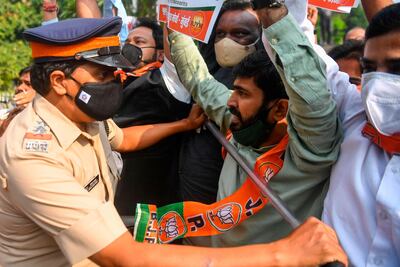The sensational arrest of a right-wing TV news anchor for allegedly abetting suicide has stirred controversy in India's media, which has faced censorship and crises of credibility in recent years.
Arnab Goswami, editor-in-chief of Republic TV and a vociferous supporter of Prime Minister Narendra Modi, was arrested in Mumbai on Wednesday over the 2018 death of an interior designer, Avnay Naik.
Naik left a suicide note claiming that the TV journalist and two others owed him more than 54 million rupees ($730,000).
Naik designed the studios of Republic TV in 2018 after Goswami, 47, founded the channel with the financial backing of a leader from Mr Modi’s Bharatiya Janata Party.
The Bombay High Court on Monday rejected Goswami's plea for interim bail – temporary release until his bail application could be heard by a lower court. It also directed the sessions court where he filed his bail application to issue a decision within four days.
The TV anchor's early morning arrest from his plush home in Mumbai set off a storm in the country’s political and media circles.
Goswami's supporters and opponents are accusing each other of undermining India’s press freedom and democracy.

He has denied the charges and accused the Maharashtra government of a political vendetta.
Goswami also accused police of assaulting him and his family members during his arrest and remains in jail awaiting a bail hearing.
Maharashtra is ruled by an alliance of Mr Modi’s political opponents, including India's main opposition Congress party.
The coalition has in recent months became the target of the host’s tabloid-style TV coverage, particularly over the death of Bollywood actor Sushant Singh Rajput in June.
Top Modi ministers condemned Goswami's arrest and asserted that the state government's action reeked of “fascism” and amounted to “muzzling press freedom and democracy”.
India’s Interior Minister, Amit Shah, Mr Modi’s close aide, said the Congress and its allies "shamed democracy” with Goswami's arrest.
“Blatant misuse of state power against Republic TV and Arnab Goswami is an attack on individual freedom and the fourth pillar of democracy,” Mr Shah tweeted.
Several hashtags trended on Twitter over the weekend in support of the anchor and BJP supporters staged protests in several cities.
But many accused BJP of hypocrisy, saying the ruling party targeted journalists and muzzled the press.
India slipped to 142 in the 2020 Press Freedom Index by Reporters Without Borders, down two places from last year.
About 50 journalists have been arrested or charged with serious offences, including terrorism, during the coronavirus pandemic, most of them in BJP-ruled states.
Often referred as the “Tucker Carlson of India”, Goswami is known for his aggressive nightly TV debates, where he routinely shouts down political and ideological opponents of Mr Modi.
He has been accused of disregarding reporting ethics and encouraging Fox-style journalism supporting the prime minister’s Hindu right-wing party and its policies.
His critics say Goswami was single-handedly destroying journalism in India.
In recent months he sharpened his attacks on the Maharashtra government during debates, including personal jibes against the State Chief Minister, Uddhav Thackeray.
Goswami's programmes have been highly critical of the state government and Mumbai police, especially over the handling of investigation into the death of Rajput.
It became an election issue in the the Bollywood actor's home state of Bihar where a BJP political alliance is fighting to retain power.
The anchor accused the Mumbai police of bungling the investigation and allegedly shielding a Bollywood-linked drug mafia.
Goswami's channel also ran a campaign against a Muslim missionary group and blamed them for spreading coronavirus.
The it hosted a series of debates on “inefficient” Mumbai police, which led to charges of defamation against the editor and his editorial team last month.
Goswami and his channel were also recently charged with bribing a TV ratings company to rig audience figures to win benefits from advertisers.
"Undoubtedly he has been provocative," Mohan Guruswamy, a leading Indian columnist, told The National.
But Guruswamy dismissed the portrayal of Goswami's arrest as an attack on media, saying he was accused of not paying a businessman who then committed suicide.
"It has nothing to do with press freedom,” he said.

